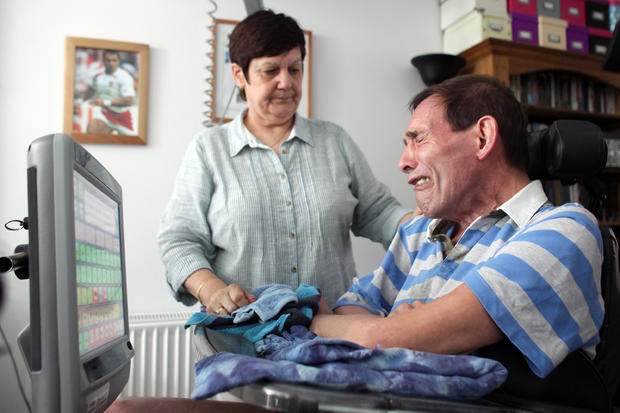U.K. court denies euthanasia requests from two men with locked-in syndrome
(CBS/AP) Tony Nicklinson, a man with "locked-in syndrome," has been denied by a British court his wish to die from physician-assisted euthanasia.
Britain's High Court on Thursday rejected Nicklinson's and another man's attempts to overturn the country's euthanasia law by refusing to legally allow doctors to end his life.
PICTURES: U.K. court says no to euthanasia for men with locked-in syndrome
Nicklinson suffered a stroke in 2005 that left him unable to speak or move below his neck. He requires constant care and communicates mostly by blinking, although his mind has remained unaffected, and his condition is not terminal.
Locked-in syndrome is the term for a rare neurological disorder in which patients are completely paralyzed and only able to blink. Patients with the syndrome are conscious and don't have any intellectual problems.
In January, the 58-year-old former rugby player had asked the High Court to declare that any doctor who kills him with his consent will not be charged with murder.
His lawyer, Saimo Chahal, at the time had said, "Most people who want to die, who are physically able to do so, can lawfully commit suicide."
The High Court however in its ruling said that challenges from Nicklinson and another man named only as "Martin" to allow others to help them die without being prosecuted were a matter for Parliament to decide.
Nicklinson said he was "devastated and heartbroken" and planned to appeal the decision.
"I am saddened that the law wants to condemn me to a life of increasing indignity and misery," he said in a statement.
Martin, 47, also has locked-in syndrome and asked for the court to allow professionals to help him die either by withholding food and water or by helping him go to a clinic in Switzerland, where euthanasia is legal, to die. His wife said she respects his wishes but does not want to help kill him.
The judges wrote that they were both "tragic cases," but said to allow euthanasia as a possible defense to murder "would usurp the proper role of Parliament."
Nicklinson had argued that British law violated his right to "private and family life" as guaranteed by the European Convention on Human Rights, on the grounds that being able to choose how to die is a matter of personal autonomy. He has previously described his life as "a living nightmare."
Legal experts weren't surprised by the ruling.
"This is a really slippery case," said Richard Huxtable, deputy director of the Ethics in Medicine department at Bristol University. "The feeling seems to be that only Parliament could give adequate thought to what sort of law should be in place and the safeguards required."
In Europe, only Belgium, Luxembourg and the Netherlands allow euthanasia. Switzerland allows assisted suicide and is the only country that helps foreigners die at a clinic near Zurich. The country allows doctors to prescribe a fatal dose of medicine for patients to take themselves.
Dr. Arthur Caplan, director of medical ethics at New York University's Langone Medical Center, said the British cases were a major departure from past euthanasia debates because neither man is terminally ill.
"Most of the cases which triggered legislation in the past were about dying people and their quality of life," he said. "We will see more of these discussions as people live longer and we decide what to do about those who are severely impaired."
Nicklinson said he hoped the courts would grant him another hearing later this year. Experts said he could take his case to the Supreme Court or to the European Court of Human Rights in Strasbourg.

